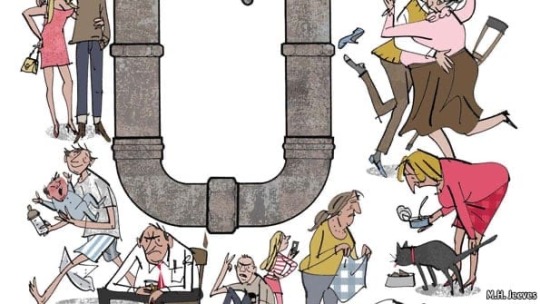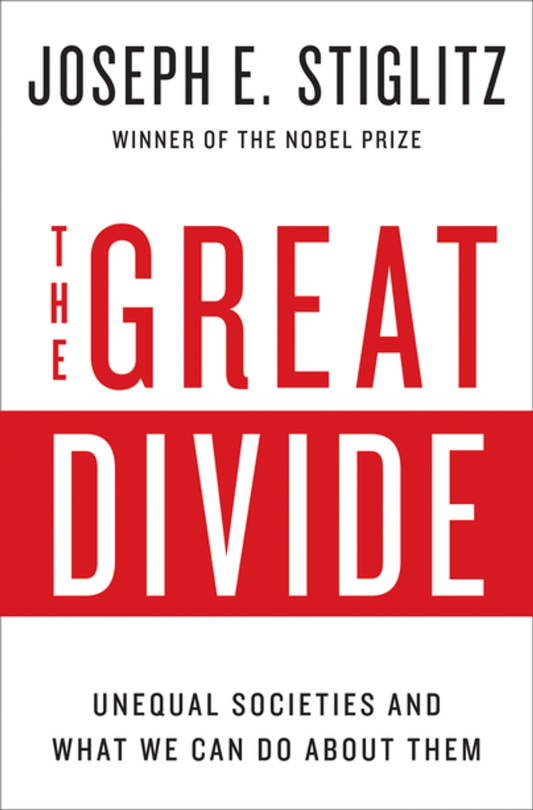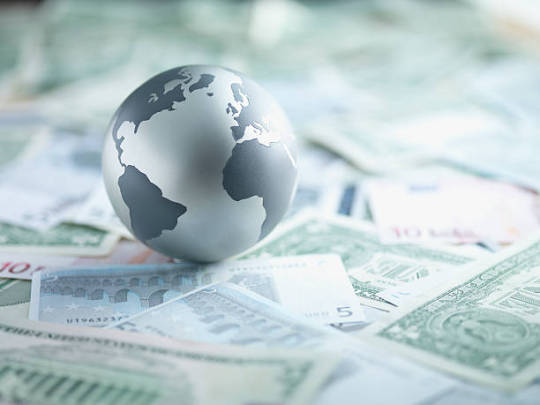#Joseph Stiglitz
Text
The problem with economic models

When students of statistics are introduced to creating and interpreting models, they are introduced to George Box’s maxim:
All models are wrong, some are useful.
It’s a call for humility and perspective, a reminder to superimpose the messy world on your clean lines.
If you’d like an essay-formatted version of this article to read or share, here’s a link to it on pluralistic.net, my surveillance-free, ad-free, tracker-free blog:
https://pluralistic.net/2023/04/03/all-models-are-wrong/#some-are-useful
Even with this benediction, modeling is forever prone to the cardinal sin of insisting that complex reality can be reduced to “a perfectly spherical cow of uniform density on a frictionless plane.” Partially that’s down to human frailty, our shared inability to tell when we’re simplifying and when we’re oversimplifying.
But complex mathematics are also a very powerful smokescreen: because so few of us are able to interpret mathematical models, much less interrogate their assumptions, models can be used as “empirical facewash,” in which bias and ideology are embedded in equations and declared to be neutral, because “math can’t be racist.”
The problems with models have come into increasing focus, as machine learning models have increasingly been used to replace human judgment in areas from bail assessment to welfare eligibility to child protective services interventions:
https://memex.craphound.com/2018/01/31/automating-inequality-using-algorithms-to-create-a-modern-digital-poor-house/
But even amidst this increasing critical interrogation of models in new domains, there is one domain where modeling is all but unquestioned: economics, specifically, macroeconomics, that is, the economics of national government budgets.
This is part of a long-run, political project to “get politics out of budgeting” -a project as absurd as “getting wet out of water.” Government budgeting is intrinsically, irreducibly political, and there is nothing more political than insisting that your own preferences and assumptions are “empirical” while anyone who questions them is “doing politics.”
This model-first pretense of neutrality is a key component of neoliberalism, which saw a vast ballooning of economists in government service — FDR employed 5,000 economists, while Reagan relied on 16,000 of them. As the jargon and methods of economics crowded out the language of politics, this ideology-that-insisted-it-wasn’t got a name: economism.
Economism’s core method is reducing human interaction to “incentives,” to the exclusion of morals or ethics — think of Margaret Thatcher’s insistence that “there is no such thing as society.” Economism reduces its subjects to homo economicus, a “rational,” “utility-maximizing” automaton responding robotically to its “perfect information” about the market.
Economism also insists that power has no place in predictions about how policies will play out. This is how the Chicago School economists were able to praise monopolies as “efficient” systems for maximizing “consumer welfare” by lowering prices without “wasteful competition.”
This pretense of mathematical perfection through monopoly ignores the problem that anti-monopoly laws seek to address, namely, the corrupting influence of monopolists, who wield power to control markets and legislatures alike. As Sen John Sherman famously said in arguing for the Sherman Act: “If we will not endure a King as a political power we should not endure a King over the production, transportation, and sale of the necessaries of life.”
https://marker.medium.com/we-should-not-endure-a-king-dfef34628153
Economism says that we can allow monopolies to form and harness them to do only good, enforcing against them when they abuse their market dominance to hike prices. But once a monopoly forms, it’s too late to enforce against them, because monopolies are both too big to fail and too big to jail:
https://doctorow.medium.com/small-government-fd5870a9462e
Today, economism is helpless to do anything about inflation, because it is ideologically incapable of recognizing the inflation is really excuseflation, in which monopolists blame pandemic supply shocks, Russian military belligerence and supposedly overgenerous covid relief programs for their own greedy profiteering:
https://pluralistic.net/2023/03/11/price-over-volume/#pepsi-pricing-power
Mathematics operates on discrete quantities like prices, while power is a quality that does not readily slot into an equation. That doesn’t mean that we can safely discard power for the convenience of a neat model. Incinerating the qualitative and doing arithmetic with the dubious quantitative residue that remains is no way to understand the world, much less run it:
https://locusmag.com/2021/05/cory-doctorow-qualia/
Economism is famously detached from the real world. As Ely Devons quipped, “If economists wished to study the horse, they wouldn’t go and look at horses. They’d sit in their studies and say to themselves, ‘What would I do if I were a horse?’”
https://pluralistic.net/2022/10/27/economism/#what-would-i-do-if-i-were-a-horse
But this disconnection isn’t merely the result of head-in-the-clouds academics who refuse to dirty their hands by venturing into the real world. Asking yourself “What would I do if I were a horse?” (or any other thing that economists are usually not, like “a poor person” or “a young mother” or “a refugee”) allows you to empiricism-wash your biases. Your prejudices can be undetectably laundered if you first render them as an equation whose details can only be understood by your co-religionists.
Two of these if-I-were-a-horse models reign invisibly and totally over our daily lives: the Congressional Budget Office model and the Penn Wharton Budget model. Every piece of proposed government policy is processed through these models, and woe betide the policy that the model condemns. Thus our entire government is conducted as a giant, semi-secret game of Computer Says No.
This week, The American Prospect is conducting a deep, critical dive into these two models, and into the enterprise of modeling itself. The series kicks off today with a pair superb pieces, one from Nobel economics laureate Joseph Stiglitz, the other from Prospect editor-in-chief David Dayen and Rakeen Mabud, chief economist for the Groundwork Collaborative.
Let’s start with the Stiglitz piece, “How Models Get the Economy Wrong,” which highlights specific ways in which the hidden assumptions of models have led us to sideline good policy (like increasing spending during recessions) and make bad policy (like cutting taxes on the rich):
https://prospect.org/economy/2023-04-03-how-models-get-economy-wrong/
First, Stiglitz sets out a general critique of the assumptions in neoclassical models, starting with the “efficient market” hypothesis, that holds that the market is already making efficient use of all our national resources, so any government spending will “crowd out” efficient private sector activity and make us all poorer.
There are trivially obvious ways in which this is untrue: every unemployed person who wants a job is not being used by the market. The government can step in — say, with a federal jobs guarantee — and employ everyone who wants a job but isn’t offered one by the public sector, and by definition, this will not crowd out private sector activity.
Less obvious — but still true — is that the private sector is riddled with inefficiencies. The idea that Google and Facebook make “efficient” use of capital when they burn billions of dollars to increase their surveillance dragnets is absurd on its face. Then there’s the billions Facebook set on fire to build a creepy dead mall it calls “the metaverse”:
https://www.youtube.com/watch?v=EiZhdpLXZ8Q
Then we come to some of the bias in the models themselves, which consistently undervalue the long-run benefits of infrastructure spending. Public investments of this kind “yield very high returns,” which means that even if a public sector project reduces private sector investment, the private investments that remain produce a higher yield, thanks to public investment in a skilled workforce and efficient ports, roads and trains.
A commonplace among model users is that we must make “The Big Tradeoff” — we can either reduce inequality, or we can increase prosperity, but not both, because reducing inequality means taking resources away from the business leaders who would otherwise build the corporations whose products would make us all better off.
Despite the fact that organizations from the OECD to the IMF have recognized that inequality is itself a brake on economic growth, fostering destructive “rent seeking” (seen today online in the form of enshittification), the most common macroeconomic models continue to presume that an unequal society will be as efficient as a pluralistic one. Indeed, model-makers treat attention to inequality as an error bordering on a mortal sin — the sin of caring about “distributional outcomes” (that is, who gets which slice of the pie) rather than “growth” (whether the pie is getting bigger).
Stiglitz says that model makers have gotten a little better in recent years, formally disavowing Herbert Hoover’s idea of expansionary austerity, which is the idea that we should cut public spending when the economy is shrinking. Common sense tells us that this will make it shrink faster, but expansionary austerity (incorrectly) predicts that governments that cut spending will produce “investor confidence” and trigger more private investment.
This reliance on what Paul Krugman calls the “Confidence Fairy” is tragically misplaced. Hoover’s cutbacks made the Great Depression worse. So did IMF cutbacks in “East Asia, Greece, Spain, Portugal, and Ireland.”
Expansionary austerity is politics dressed up as economics. Indeed, the political ideology subsumed into our bedrock models has caused governments to fail to anticipate crisis after crisis, including the 2008 Great Financial Crisis.
The politics in modeling are especially obvious in the process running up to the Trump tax cuts (as is often the case with Trump, he draws with a fisted crayon where others delicately shade with a fine pencil, making it easier to see the work for what it is) (see also: E. Musk).
Axiomatic to model-building is the idea that if you tax something, you’ll get less of it (“incentives matter”). The theory of corporate tax cuts goes like this: “if we tax corporations for the money they might otherwise use to build new plant and hire new workers, they will do less of those things.”
That’s a reasonable assumption — which is why we don’t tax companies on capital investments and their payrolls. These expenses are deducted from a company’s profits before it calculates its taxes. Corporate taxes are levied on profits, net of spending on labor and plant.
But when the CBO modeled the Trump cuts, it operated on the assumption that the existing tax system was punishing companies for hiring people and expanding operations, and thus concluded the reducing taxes would lead to more of these activities. On that basis, the tax cuts were declared to be expansionary, a means of driving new private sector activity. In reality, all they did was create more profits, which rich people used to bid up the prices of assets, creating a dangerous asset bubble — not investment in productive capacity.
In “Hidden in Plain Sight,” the other Prospect piece that dropped today, Dayen and Mabud tell us just how wrong the models were about the Trump cuts:
https://prospect.org/economy/2023-04-03-hidden-in-plain-sight/
The CBO predicted that the cuts would drive a 0.7% increase in GDP over a decade, while Penn Wharton predicted 0.6–1.1% growth. Both were very, very wrong:
https://www.npr.org/2019/12/20/789540931/2-years-later-trump-tax-cuts-have-failed-to-deliver-on-gops-promises
Despite the manifest defects of these models, we still let them imprison our politics. When Elizabeth Warren proposed a 2% wealth tax on assets over $50m, she asserted that this would reduce billionaires’ fortunes by $3.75T over 10 years, but the Penn Wharton model knocked $1T off it, and declared that the real impact of the policy would be a reduction in investment, depressing long-run growth. The politics of a wealth tax are sound — the kind of politics that wins elections and restores faith in democracy — but the economism of models sweeps the proposal off the table and into the dustbin of history.
The Penn Wharton model simply refuses to factor in absolutely key aspects of a wealth tax plan, from the impact of increased enforcement to the economic benefits of universal child care, increased education funding, student debt cancellation and other programs that could be enacted with the fiscal space opened up by reducing billionaires’ spending power.
The Warren policy is rare because we got to hear about it — through a national election campaign — before it was strangled by the model-makers. More often, proposals like this are quietly snuffed out even before they’re introduced to the legislature, when they are run through the model and told Computer Says No.
Modeling isn’t intrinsically bad, but “all models are wrong” and what determines whether a model is useful are the politics of its assumptions. Economism insists that there are no politics in model-making, which creates unfixable flaws in its models.
One core political assumption in economism’s models is that government shouldn’t exercise power to produce outcomes — rather, it should “nudge” markets with incentives (which, we are constantly reminded, “matter”). This means that we can’t ban pollution — we can only offer “cap and trade” systems to incentivize companies to pollute less. It means we can’t do Medicare For All, we can only “bend the cost-curve” with minor interventions like forcing hospitals to publish their rate-cards.
Economism — and its institutions, like the CBO — are “short-run Keynesian and long-run classical” — that is, they only consider the benefits of public spending over the shortest of timespans, and assume that these evaporate over long time-scales. That’s exactly backwards, as anyone who’s ever traveled on a federal highway or visited a national park can attest:
https://prospect.org/politics/congress-biggest-obstacle-congressional-budget-office/
All of this is worsened by politicians, who exploit the primacy of economism to attack their adversaries. When the CBO or Penn Wharton release a report on a policy, they often wrap their conclusions with caveats about uncertainties and ranges — but these cautions are jettisoned by opportunistic politicians who seize a single headline figure and use it as a club against their opponents.
In the coming week, the Prospect will run deep dives into the defects of CBO and Penn Wharton, along with other commentary. It’s very important work, throwing open the doors to the inner sanctum of economism’s sacred temple. I’ll be following it eagerly.
Have you ever wanted to say thank you for these posts? Here’s how you can: I’m kickstarting the audiobook for my next novel, a post-cyberpunk anti-finance finance thriller about Silicon Valley scams called Red Team Blues. Amazon’s Audible refuses to carry my audiobooks because they’re DRM free, but crowdfunding makes them possible.
Image:
bert knottenbeld (modified)
https://www.flickr.com/photos/bertknot/8375267645/
CC BY-SA 2.0
https://creativecommons.org/licenses/by-sa/2.0/
[[Image ID: A Tron-like plane of glowing grid-squares. Two spherical cows roll about on the plane, chased by motion lines. The gridlines are decorated with complex equations from the Penn-Wharton Budget Model.]]
#pluralistic#the american prospect#penn wharton budget model#some models are useful#congressional budget office#macroeconomics#all models are wrong#joseph stiglitz#economism#inevitabilism
82 notes
·
View notes
Text
By Olivia Rosane
Common Dreams
Oct. 13, 2023
"As the scale of climate change impresses itself more and more on us, we are going to need bolder things," Stiglitz said at the IMF and World Bank's annual meeting in Morocco.
The International Monetary Fund, or IMF, should give poorer nations $300 billion a year to respond to the climate emergency, Nobel Prize-winning economist Joseph Stiglitz said.
Stiglitz outlined his recommendation in an interview with The Guardian as he attended the fund's annual meeting with the World Bank in Marrakesh, Morocco, which runs from Monday, October 9 to Sunday, October 15.
"As the scale of climate change impresses itself more and more on us, we are going to need bolder things," Stiglitz said.
In his call, Stiglitz joined the push for the IMF to release more Special Drawing Rights (SDRs), a reserve asset that can be exchanged for cash. Wealthy nations also have the option of placing their SDRs in a fund for poorer countries.
"Basically, it is printing money," Stiglitz said. "It wouldn't be inflationary but it would be transformative."
Stiglitz' remarks came about a week after nearly 60 U.S. Democratic lawmakers sent a letter to President Joe Biden and Treasury Secretary Janet Yellen asking them to support a new allocation of SDRs. The IMF issued $650 billion in SDRs in 2021 to help with the recovery from the Covid-19 pandemic, and the legislators wanted it to issue the same amount to help nations address the climate crisis, war, and future pandemics.
Stiglitz's call is even bolder at $300 billion a year, because the lawmakers limited themselves to an amount that the IMF could approve without a vote from Congress. While Stiglitz acknowledged his plan was ambitious and unlikely to pass through the current U.S. Congress, it was worth pushing for given the urgency of the moment.
"When the time comes and we are frying and somebody says: 'How do we get out of the frying pan?,' this [annual SDR allocations] is one way of doing so," he told The Guardian.
Stiglitz said the money should be used to help poorer nations fund their equivalent to the U.S. Inflation Reduction Act—which invested $370 billion in renewable energy. But it's impossible for less wealthy countries to make that kind of investment on their own, Stiglitz said.
"Developing countries can't do it on any scale," he told The Guardian. "Unless developing countries and emerging markets reduce their emissions, no matter what pieties we do in the U.S. and Europe, we will get global warming. The rhetoric is about doing something about climate change and then rather than getting onboard [the people] you most need to get onboard, you alienate them."
In a report published Thursday, the Center for Economic and Policy Research (CEPR) agreed that many poorer nations are not in the financial position to take ambitious climate action, and proposed more SDRs as one potential remedy. What's holding them back, CEPR said, was a large debt burden: Almost 80 low-to-middle-income countries face debt distress, and three-fourths of these are especially vulnerable to climate impacts. This creates a "vicious cycle" in which countries struggle to both service debt and respond to extreme weather events, leaving them unable to either get out of debt or recover from disasters and invest in the future.
"Most of the world is going through what many have termed a 'polycrisis,' facing down high levels of external debt, combined with interlocking crises of food insecurity, fluctuating energy prices, impacts of war, and of course, the climate crisis," report coauthor Ivana Vasic Lalovic said in a statement. "Countries are limited in what they can do to respond to the climate crisis, though, when they are forced to divert so much of their resources toward servicing their debts."
The report, titled The Growing Debt Burdens of Global South Countries: Standing in the Way of Climate and Development Goals, called on major financial institutions to address the situation by updating debt resolution frameworks, providing debt relief, financing through grants instead of loans, and allocating more Special Drawing Rights (SDRs).
"The international finance community needs to accept that the current dynamic, which prioritizes debt service–no matter how burdensome–over human needs and the urgency of climate crisis preparedness and response is unsustainable," coauthor Lara Merling said in a statement. "They need to step forward with solutions. Millions of lives may depend on it."
#IMF#Special Drawing Rights#SDR#climate crisis#climate change#joseph stiglitz#Center for Economic and Policy Research#CEPR
12 notes
·
View notes
Text
i will never shut up about my local library's cafe and bookstore. i got a cappucino and hardcover signed copy of stiglitz's the euro for $6.09
3 notes
·
View notes
Text
Lula's Plans to Tax the Richest Benefit Brazil, Says Nobel Winner Joseph Stiglitz
According to Joseph Stiglitz, societies with less inequality have better economic performance, from which everyone benefits

The Luiz Inácio Lula da Silva (PT) government's proposals to end tax advantages that allow richer people to pay less taxes will have a positive effect on the Brazilian economy, says Joseph Stiglitz, winner of the Nobel Prize in 2001.
"It's no surprise that the rich say: don't tax us because it will be bad for the economy. I would be surprised if they didn't say that. It's a selfish argument. But it has no economic basis", says the economist in an interview with Folha.
The Nobel winner was in Brazil this week for a series of events and meetings, including a meeting with Lula.
Continue reading.
#brazil#politics#brazilian politics#economy#taxation#joseph stiglitz#mod nise da silveira#image description in alt
4 notes
·
View notes
Text
2023: The Past, Present and Future of Chinese Economics
This article by Peking University Professor Yao Yang, calling for a greater focus on understanding Chinese domestic economic issues rather than theoretical issues reminds just slightly of the July 2023 article by Su Changhe, Dean of the School of International Relations and Public Affairs, Fudan University “China’s Autonomous Political Science Paradigm and Sharing it with the…
View On WordPress
#aging#China#Chinese economics#Communism#Communist Party#contributions#control#criticism#Daron Acemoglu#development#economics#entity list#financial accelerator#government procurement#Hai Wen#Hayek#Heckman#James Heckman#Joseph Stiglitz#market#market economy#Marx#Milton Friedman#planned economy#PRC#publish or perish#rule by law#rule of law#savings#Scott Rozelle
1 note
·
View note
Text
Lula Amplia Críticas aos Juros altos de Roberto Campos Neto
O presidente Lula completou 100 dias no cargo e tem chamado a atenção para a necessidade de reduzir a taxa de juros do Banco Central, que está em 13,75%. Segundo o presidente, essa taxa sufoca o crédito a empresas e famílias, prejudica o consumo, afugenta investidores e agrava o desemprego. Ele argumenta que “ninguém consegue tomar dinheiro emprestado a 13,75%, a um juro real de 8% se você…

View On WordPress
#Banco Central#Crescimento Econômico#economia#Governo Lula#Inflação#Joseph Stiglitz#Juros#Meta de Inflação#Nobel de Economia Joseph Stiglitz#Partido dos Trabalhadores#Presidente do Banco Central#Presidente Lula#PT#Roberto Campos Neto#Taxa Selic
0 notes
Text
Historias de hoy
100% de la energía en Islandia ya es renovable🔋
Entrevista al Nobel Joseph Stiglitz💡
Amplían plazo para solicitar encuesta Sisbén IV📋
Severo Sinvergüenza, porque es tendencia 🍢
La camioneta más vendida Colombia vale más de 100 millones de pesos🚙
#Islandia#Renovable#Geotérmica#Nobel#Economía#Joseph Stiglitz#Sisben IV#Severo sinverguenza#Toyota Corolla
0 notes
Text
Stiglitz criticó a Pfizer por 'intentar extorsionar' a la Argentina
Stiglitz criticó a Pfizer por ‘intentar extorsionar’ a la Argentina
Joseph Stigliz. / Foto: Gustavo Amarelle.
El premio Nobel de Economía Joseph Stiglitz criticó al laboratorio multinacional Pfizer por “intentar extorsionar” a la Argentina y a otros países de la región” por la administración de la vacuna y tratamiento anti-Covid”.Además felicitó al presidente Alberto Fernández “porque hizo que la gente tuviera vacunas a pesar de extorsión que intentó hacer…

View On WordPress
#Alberto Fernández#Argentina#Centro Cultural Kirchner (CCK)#CEPAL#extorsión#Joseph Stiglitz#Pfizer#Premio Nobel
0 notes
Text
conference/summit/??? Thing is over but two days of trying (with varying levels of success) to strike up conversations with people whose work i admire has left me like

#i got put at a table with joseph stiglitz and as i later realized the fucking director of the cfpb#🫠🫠🫠🫠
23 notes
·
View notes
Text
By Brett Wilkins
Common Dreams
Feb. 2, 2024
"These youth have been politically targeted and persecuted, for over eight years, as the enormous power and machine of the Department of Justice singles them out among tens of thousands of other plaintiffs."
As the Biden administration seeks to derail a historic youth-led climate lawsuit against the U.S. government, plaintiffs in the suit—some of them now in their mid-to-late 20s—on Thursday moved to block the Department of Justice from further delaying the case.
Plaintiffs in Juliana v. United States filed a challenge to the Biden administration's bid for a stay in the case, calling the Justice Department's latest petition for a writ of mandamus "nothing short of shocking."
The DOJ's Justice Manual "provides that a writ of mandamus is an 'extraordinary remedy, which should only be used in exceptional circumstances of peculiar emergency or public importance,' the plaintiffs' filing notes. "The only emergency in this case is the climate emergency that defendants created and the Department of Justice prolongs with further delays."
"The true irreparable harm is the approximate cost of climate disasters or other climate economic harm since this case began and even since the first trial in this case was stopped in October 2018."
Nobel Prize-winning economist Joseph Stiglitz—a longtime backer of the plaintiffs—filed a declaration supporting their motion. Lambasting the DOJ's claim that the agency is "irreparably harmed" by having to dedicate human and financial resources to the trial, Stiglitz wrote that "to suggest the harm to children's health and homes and constitutional rights is worth less than the money the government has to spend to litigate a case is to suggest every case could be stayed only because it cost taxpayer dollars to litigate."
"The true irreparable harm is the approximate cost of climate disasters or other climate economic harm since this case began and even since the first trial in this case was stopped in October 2018 and through the end of 2023, along with any projections of the range of harm going forward," Stiglitz added, "as well as the amount the U.S. has spent (and continues to spend) subsidizing the fossil fuel industry."
Originally filed in 2015 when the plaintiffs were between 8 and 19 years old, Juliana v. United States accuses the federal government of violating young people's constitutional rights to life, liberty, and property, and argues that its actions contributing to the planetary emergency constitute a failure to protect essential public trust resources.
The Obama, Trump, and Biden administrations have all worked to kill the case, delaying trial by years. In 2018, the U.S. Supreme Court stopped the case from going to trial days before it was set to begin. On December 29, U.S. District Court Judge Ann Aiken ruled that the plaintiffs could proceed to trial, which was set to begin January 19. However, on January 18 the DOJ said it would file for a writ of mandamus.
The incessant delays have been accompanied by what the plaintiffs describe as "the most aggressive and discriminatory legal tactics" used against them by the government.
As the plaintiffs' latest filing explains:
These youth have been politically targeted and persecuted, for over eight years, as the enormous power and machine of the Department of Justice singles them out among tens of thousands of other plaintiffs, in an effort to stop our nation's youth from taking the witness stand, when every court to review the Juliana plaintiffs' claims has said that there is life and death at stake, the survival of the nation is at stake, and there is merit to their constitutional claims. All they seek after trial is a declaratory judgment of their rights and the government's wrongs, just as the students in Brown v. Board of Education did 70 years ago.
As Stiglitz concluded in his motion, "The federal government has expended taxpayer money taking the case up on appeal, rather
than allowing it to go to trial."
"The amount of time and money spent over the past six years seeking early appeals and mandamus has been large," he added. "We have already laid out the magnitude of the damages to the youth plaintiffs, their generation, and the public. In economic terms, and for the health of the nation, the balancing of potential harms is clear: This case should finally be decided at trial without further delay."
As the Biden administration seeks to derail a historic youth-led climate lawsuit against the U.S. government, plaintiffs in the suit—some of them now in their mid-to-late 20s—on Thursday moved to block the Department of Justice from further delaying the case.
Plaintiffs in Juliana v. United States filed a challenge to the Biden administration's bid for a stay in the case, calling the Justice Department's latest petition for a writ of mandamus "nothing short of shocking."
The DOJ's Justice Manual "provides that a writ of mandamus is an 'extraordinary remedy, which should only be used in exceptional circumstances of peculiar emergency or public importance,' the plaintiffs' filing notes. "The only emergency in this case is the climate emergency that defendants created and the Department of Justice prolongs with further delays."
"The true irreparable harm is the approximate cost of climate disasters or other climate economic harm since this case began and even since the first trial in this case was stopped in October 2018."
Nobel Prize-winning economist Joseph Stiglitz—a longtime backer of the plaintiffs—filed a declaration supporting their motion. Lambasting the DOJ's claim that the agency is "irreparably harmed" by having to dedicate human and financial resources to the trial, Stiglitz wrote that "to suggest the harm to children's health and homes and constitutional rights is worth less than the money the government has to spend to litigate a case is to suggest every case could be stayed only because it cost taxpayer dollars to litigate."
"The true irreparable harm is the approximate cost of climate disasters or other climate economic harm since this case began and even since the first trial in this case was stopped in October 2018 and through the end of 2023, along with any projections of the range of harm going forward," Stiglitz added, "as well as the amount the U.S. has spent (and continues to spend) subsidizing the fossil fuel industry."
Originally filed in 2015 when the plaintiffs were between 8 and 19 years old, Juliana v. United States accuses the federal government of violating young people's constitutional rights to life, liberty, and property, and argues that its actions contributing to the planetary emergency constitute a failure to protect essential public trust resources.
The Obama, Trump, and Biden administrations have all worked to kill the case, delaying trial by years. In 2018, the U.S. Supreme Court stopped the case from going to trial days before it was set to begin. On December 29, U.S. District Court Judge Ann Aiken ruled that the plaintiffs could proceed to trial, which was set to begin January 19. However, on January 18 the DOJ said it would file for a writ of mandamus.
The incessant delays have been accompanied by what the plaintiffs describe as "the most aggressive and discriminatory legal tactics" used against them by the government.
As the plaintiffs' latest filing explains:
These youth have been politically targeted and persecuted, for over eight years, as the enormous power and machine of the Department of Justice singles them out among tens of thousands of other plaintiffs, in an effort to stop our nation's youth from taking the witness stand, when every court to review the Juliana plaintiffs' claims has said that there is life and death at stake, the survival of the nation is at stake, and there is merit to their constitutional claims. All they seek after trial is a declaratory judgment of their rights and the government's wrongs, just as the students in Brown v. Board of Education did 70 years ago.
As Stiglitz concluded in his motion, "The federal government has expended taxpayer money taking the case up on appeal, rather
than allowing it to go to trial."
"The amount of time and money spent over the past six years seeking early appeals and mandamus has been large," he added. "We have already laid out the magnitude of the damages to the youth plaintiffs, their generation, and the public. In economic terms, and for the health of the nation, the balancing of potential harms is clear: This case should finally be decided at trial without further delay."
As the Biden administration seeks to derail a historic youth-led climate lawsuit against the U.S. government, plaintiffs in the suit—some of them now in their mid-to-late 20s—on Thursday moved to block the Department of Justice from further delaying the case.
Plaintiffs in Juliana v. United States filed a challenge to the Biden administration's bid for a stay in the case, calling the Justice Department's latest petition for a writ of mandamus "nothing short of shocking."
The DOJ's Justice Manual "provides that a writ of mandamus is an 'extraordinary remedy, which should only be used in exceptional circumstances of peculiar emergency or public importance,' the plaintiffs' filing notes. "The only emergency in this case is the climate emergency that defendants created and the Department of Justice prolongs with further delays."
"The true irreparable harm is the approximate cost of climate disasters or other climate economic harm since this case began and even since the first trial in this case was stopped in October 2018."
Nobel Prize-winning economist Joseph Stiglitz—a longtime backer of the plaintiffs—filed a declaration supporting their motion. Lambasting the DOJ's claim that the agency is "irreparably harmed" by having to dedicate human and financial resources to the trial, Stiglitz wrote that "to suggest the harm to children's health and homes and constitutional rights is worth less than the money the government has to spend to litigate a case is to suggest every case could be stayed only because it cost taxpayer dollars to litigate."
"The true irreparable harm is the approximate cost of climate disasters or other climate economic harm since this case began and even since the first trial in this case was stopped in October 2018 and through the end of 2023, along with any projections of the range of harm going forward," Stiglitz added, "as well as the amount the U.S. has spent (and continues to spend) subsidizing the fossil fuel industry."
Originally filed in 2015 when the plaintiffs were between 8 and 19 years old, Juliana v. United States accuses the federal government of violating young people's constitutional rights to life, liberty, and property, and argues that its actions contributing to the planetary emergency constitute a failure to protect essential public trust resources.
The Obama, Trump, and Biden administrations have all worked to kill the case, delaying trial by years. In 2018, the U.S. Supreme Court stopped the case from going to trial days before it was set to begin. On December 29, U.S. District Court Judge Ann Aiken ruled that the plaintiffs could proceed to trial, which was set to begin January 19. However, on January 18 the DOJ said it would file for a writ of mandamus.
The incessant delays have been accompanied by what the plaintiffs describe as "the most aggressive and discriminatory legal tactics" used against them by the government.
As the plaintiffs' latest filing explains:
These youth have been politically targeted and persecuted, for over eight years, as the enormous power and machine of the Department of Justice singles them out among tens of thousands of other plaintiffs, in an effort to stop our nation's youth from taking the witness stand, when every court to review the Juliana plaintiffs' claims has said that there is life and death at stake, the survival of the nation is at stake, and there is merit to their constitutional claims. All they seek after trial is a declaratory judgment of their rights and the government's wrongs, just as the students in Brown v. Board of Education did 70 years ago.
As Stiglitz concluded in his motion, "The federal government has expended taxpayer money taking the case up on appeal, rather
than allowing it to go to trial."
"The amount of time and money spent over the past six years seeking early appeals and mandamus has been large," he added. "We have already laid out the magnitude of the damages to the youth plaintiffs, their generation, and the public. In economic terms, and for the health of the nation, the balancing of potential harms is clear: This case should finally be decided at trial without further delay."
#juliana v. united states#climate change#u.s. department of justice#biden administration#joseph stiglitz
1 note
·
View note
Text

watertight legal defence: "your honour, I can't possibly be made to pay this fine. look at how much money I spent breaking the law in the first place!"
#absolutely unhinged#the anishinaabe have two time nobel economic laureate joseph stiglitz coming to argue for them soon#seems like these clowns are just throwing shit at the wall to get a cheaper settlement lmfao#i guess i should tag this like#Canadian politics#cdnpoli
84 notes
·
View notes
Text
Stiglitz Joins Lula in Slamming Brazil’s Interest Rate Levels

Economist Joseph Stiglitz called Brazil’s interest rate levels “astounding,” aligning himself with a chorus of critics led by President Luiz Inacio Lula da Silva who believe the country’s borrowing costs are hindering economic growth.
The Nobel Prize winner said on Monday that Brazil’s key rate of 13.75% and real rate of around 8% above inflation are “enough to kill any economy.”
“Where would you have been if you had more reasonable monetary policy?” Stiglitz said at an event hosted by Brazil’s development bank BNDES in Rio de Janeiro. High rates are “one of the factors that have led to poor performance for a longer period.”
Continue reading.
#brazil#politics#brazilian politics#economy#monetary policy#joseph stiglitz#mod nise da silveira#image description in alt
2 notes
·
View notes
Text
The U-Bend of Life! Why, Beyond Middle Age, People Get Happier As They Get Older
— December 16th 2010 | Wednesday 16th August 2023 | Christmas Specials | Age and happiness

ASK people how they feel about getting older, and they will probably reply in the same vein as Maurice Chevalier: “Old age isn't so bad when you consider the alternative.” Stiffening joints, weakening muscles, fading eyesight and the clouding of memory, coupled with the modern world's careless contempt for the old, seem a fearful prospect—better than death, perhaps, but not much. Yet mankind is wrong to dread ageing. Life is not a long slow decline from sunlit uplands towards the valley of death. It is, rather, a U-bend.
When people start out on adult life, they are, on average, pretty cheerful. Things go downhill from youth to middle age until they reach a nadir commonly known as the mid-life crisis. So far, so familiar. The surprising part happens after that. Although as people move towards old age they lose things they treasure—vitality, mental sharpness and looks—they also gain what people spend their lives pursuing: happiness.
This curious finding has emerged from a new branch of economics that seeks a more satisfactory measure than money of human well-being. Conventional economics uses money as a proxy for utility—the dismal way in which the discipline talks about happiness. But some economists, unconvinced that there is a direct relationship between money and well-being, have decided to go to the nub of the matter and measure happiness itself.
These ideas have penetrated the policy arena, starting in Bhutan, where the concept of Gross National Happiness shapes the planning process. All new policies have to have a GNH assessment, similar to the environmental-impact assessment common in other countries. In 2008 France's president, Nicolas Sarkozy, asked two Nobel-prize-winning economists, Amartya Sen and Joseph Stiglitz, to come up with a broader measure of national contentedness than GDP. Then last month, in a touchy-feely gesture not typical of Britain, David Cameron announced that the British government would start collecting figures on well-being.
There are already a lot of data on the subject collected by, for instance, America's General Social Survey, Eurobarometer and Gallup. Surveys ask two main sorts of question. One concerns people's assessment of their lives, and the other how they feel at any particular time. The first goes along the lines of: thinking about your life as a whole, how do you feel? The second is something like: yesterday, did you feel happy/contented/angry/anxious? The first sort of question is said to measure global well-being, and the second hedonic or emotional well-being. They do not always elicit the same response: having children, for instance, tends to make people feel better about their life as a whole, but also increases the chance that they felt angry or anxious yesterday.
Statisticians trawl through the vast quantities of data these surveys produce rather as miners panning for gold. They are trying to find the answer to the perennial question: what makes people happy?
Four main factors, it seems: gender, personality, external circumstances and age. Women, by and large, are slightly happier than men. But they are also more susceptible to depression: a fifth to a quarter of women experience depression at some point in their lives, compared with around a tenth of men. Which suggests either that women are more likely to experience more extreme emotions, or that a few women are more miserable than men, while most are more cheerful.
Two personality traits shine through the complexity of economists' regression analyses: neuroticism and extroversion. Neurotic people—those who are prone to guilt, anger and anxiety—tend to be unhappy. This is more than a tautological observation about people's mood when asked about their feelings by pollsters or economists. Studies following people over many years have shown that neuroticism is a stable personality trait and a good predictor of levels of happiness. Neurotic people are not just prone to negative feelings: they also tend to have low emotional intelligence, which makes them bad at forming or managing relationships, and that in turn makes them unhappy.
Whereas neuroticism tends to make for gloomy types, extroversion does the opposite. Those who like working in teams and who relish parties tend to be happier than those who shut their office doors in the daytime and hole up at home in the evenings. This personality trait may help explain some cross-cultural differences: a study comparing similar groups of British, Chinese and Japanese people found that the British were, on average, both more extrovert and happier than the Chinese and Japanese.
Then there is the role of circumstance. All sorts of things in people's lives, such as relationships, education, income and health, shape the way they feel. Being married gives people a considerable uplift, but not as big as the gloom that springs from being unemployed. In America, being black used to be associated with lower levels of happiness—though the most recent figures suggest that being black or Hispanic is nowadays associated with greater happiness. People with children in the house are less happy than those without. More educated people are happier, but that effect disappears once income is controlled for. Education, in other words, seems to make people happy because it makes them richer. And richer people are happier than poor ones—though just how much is a source of argument.
The View From Winter
Lastly, there is age. Ask a bunch of 30-year-olds and another of 70-year-olds (as Peter Ubel, of the Sanford School of Public Policy at Duke University, did with two colleagues, Heather Lacey and Dylan Smith, in 2006) which group they think is likely to be happier, and both lots point to the 30-year-olds. Ask them to rate their own well-being, and the 70-year-olds are the happier bunch. The academics quoted lyrics written by Pete Townshend of The Who when he was 20: “Things they do look awful cold / Hope I die before I get old”. They pointed out that Mr Townshend, having passed his 60th birthday, was writing a blog that glowed with good humour.

Mr Townshend may have thought of himself as a youthful radical, but this view is ancient and conventional. The “seven ages of man”—the dominant image of the life-course in the 16th and 17th centuries—was almost invariably conceived as a rise in stature and contentedness to middle age, followed by a sharp decline towards the grave. Inverting the rise and fall is a recent idea. “A few of us noticed the U-bend in the early 1990s,” says Andrew Oswald, professor of economics at Warwick Business School. “We ran a conference about it, but nobody came.”
Since then, interest in the U-bend has been growing. Its effect on happiness is significant—about half as much, from the nadir of middle age to the elderly peak, as that of unemployment. It appears all over the world. David Blanchflower, professor of economics at Dartmouth College, and Mr Oswald looked at the figures for 72 countries. The nadir varies among countries—Ukrainians, at the top of the range, are at their most miserable at 62, and Swiss, at the bottom, at 35—but in the great majority of countries people are at their unhappiest in their 40s and early 50s. The global average is 46.
The U-bend shows up in studies not just of global well-being but also of hedonic or emotional well-being. One paper, published this year by Arthur Stone, Joseph Schwartz and Joan Broderick of Stony Brook University, and Angus Deaton of Princeton, breaks well-being down into positive and negative feelings and looks at how the experience of those emotions varies through life. Enjoyment and happiness dip in middle age, then pick up; stress rises during the early 20s, then falls sharply; worry peaks in middle age, and falls sharply thereafter; anger declines throughout life; sadness rises slightly in middle age, and falls thereafter.
Turn the question upside down, and the pattern still appears. When the British Labour Force Survey asks people whether they are depressed, the U-bend becomes an arc, peaking at 46.
Happier, No Matter What
There is always a possibility that variations are the result not of changes during the life-course, but of differences between cohorts. A 70-year-old European may feel different to a 30-year-old not because he is older, but because he grew up during the second world war and was thus formed by different experiences. But the accumulation of data undermines the idea of a cohort effect. Americans and Zimbabweans have not been formed by similar experiences, yet the U-bend appears in both their countries. And if a cohort effect were responsible, the U-bend would not show up consistently in 40 years' worth of data.
Another possible explanation is that unhappy people die early. It is hard to establish whether that is true or not; but, given that death in middle age is fairly rare, it would explain only a little of the phenomenon. Perhaps the U-bend is merely an expression of the effect of external circumstances. After all, common factors affect people at different stages of the life-cycle. People in their 40s, for instance, often have teenage children. Could the misery of the middle-aged be the consequence of sharing space with angry adolescents? And older people tend to be richer. Could their relative contentment be the result of their piles of cash?
The answer, it turns out, is no: control for cash, employment status and children, and the U-bend is still there. So the growing happiness that follows middle-aged misery must be the result not of external circumstances but of internal changes.
People, studies show, behave differently at different ages. Older people have fewer rows and come up with better solutions to conflict. They are better at controlling their emotions, better at accepting misfortune and less prone to anger. In one study, for instance, subjects were asked to listen to recordings of people supposedly saying disparaging things about them. Older and younger people were similarly saddened, but older people less angry and less inclined to pass judgment, taking the view, as one put it, that “you can't please all the people all the time.”
There are various theories as to why this might be so. Laura Carstensen, professor of psychology at Stanford University, talks of “the uniquely human ability to recognise our own mortality and monitor our own time horizons”. Because the old know they are closer to death, she argues, they grow better at living for the present. They come to focus on things that matter now—such as feelings—and less on long-term goals. “When young people look at older people, they think how terrifying it must be to be nearing the end of your life. But older people know what matters most.” For instance, she says, “young people will go to cocktail parties because they might meet somebody who will be useful to them in the future, even though nobody I know actually likes going to cocktail parties.”
Death of Ambition, Birth of Acceptance
There are other possible explanations. Maybe the sight of contemporaries keeling over infuses survivors with a determination to make the most of their remaining years. Maybe people come to accept their strengths and weaknesses, give up hoping to become chief executive or have a picture shown in the Royal Academy, and learn to be satisfied as assistant branch manager, with their watercolour on display at the church fete. “Being an old maid”, says one of the characters in a story by Edna Ferber, an (unmarried) American novelist, was “like death by drowning—a really delightful sensation when you ceased struggling.” Perhaps acceptance of ageing itself is a source of relief. “How pleasant is the day”, observed William James, an American philosopher, “when we give up striving to be young—or slender.”
Whatever the causes of the U-bend, it has consequences beyond the emotional. Happiness doesn't just make people happy—it also makes them healthier. John Weinman, professor of psychiatry at King's College London, monitored the stress levels of a group of volunteers and then inflicted small wounds on them. The wounds of the least stressed healed twice as fast as those of the most stressed. At Carnegie Mellon University in Pittsburgh, Sheldon Cohen infected people with cold and flu viruses. He found that happier types were less likely to catch the virus, and showed fewer symptoms of illness when they did. So although old people tend to be less healthy than younger ones, their cheerfulness may help counteract their crumbliness.
Happier people are more productive, too. Mr Oswald and two colleagues, Eugenio Proto and Daniel Sgroi, cheered up a bunch of volunteers by showing them a funny film, then set them mental tests and compared their performance to groups that had seen a neutral film, or no film at all. The ones who had seen the funny film performed 12% better. This leads to two conclusions. First, if you are going to volunteer for a study, choose the economists' experiment rather than the psychologists' or psychiatrists'. Second, the cheerfulness of the old should help counteract their loss of productivity through declining cognitive skills—a point worth remembering as the world works out how to deal with an ageing workforce.
The ageing of the rich world is normally seen as a burden on the economy and a problem to be solved. The U-bend argues for a more positive view of the matter. The greyer the world gets, the brighter it becomes—a prospect which should be especially encouraging to Economist readers (average age 47).
— This article appeared in the Christmas Specials section of the print edition under the headline "The U-Bend of Life"
#Middle-aged | Older People#U-Bend of Life#Christmas Specials | Age and Happiness#Maurice Chevalier#Old Age | Alternative#Vitality | Mental Sharpness | Happiness#Bhutan 🇧🇹#Gross National Happiness#Nobel Prize Winning Economists | Amartya Sen | Joseph Stiglitz#America's General Social Survey#Happy | Contented | Angry | Anxious#Main Factors: Gender | Personality | External Circumstances and Age#Women 😂 | Men 😤
0 notes
Text
The Great Divide - Joseph E. Stiglitz

Summary: Economist Joseph E. Stiglitz looks at the growing divide between the rich and everyone else in the United States, the causes of that gap and its consequences.
Quote: “Our inequality—the extremes to which it has grown, the forms it has taken—is not inevitable; it is not the result of inexorable laws or economics or physics; it is a matter of choice, of our policies; and these in turn are the result of our politics.”
My rating: 3.83/5.0 Goodreads: 4.0/5.0
Review: Though the collection of essays were already retrospective when the book was published in 2015, they are still terribly relevant. Stiglitz talks about the dangers of poorly regulated banks, the failure of austerity to achieve growth, the debt ceiling, the dangers of economic inequality to democracy, and how to properly use economic stimulus. Amazingly, he not only makes these weighty topics feel urgent, he also makes them interesting. The popular journalistic style of most of the essays helps, as does his clear reinforcement of points throughout the book. The book is definitely targeted towards those with limited knowledge about how financial regulation works, which was perfect for me.
1 note
·
View note
Text
Ketika Uang Menguasai Dunia
Ketika Uang Menguasai Dunia
istock
Adalah sebuah kebodohan bahwa terjadinya resesi dan depresi ekonomi itu merupakan sesuatu yang natural dan bagian dari siklus ekonomi biasa. Para ekonom sebenarnya sedang membohongi kita, melalui data dan analisis ekonomi, yang seolah tak terbantahkan. Sebab realitasnya adalah semua by design. Kenaikan suku bunga The Fed misalnya, buka hanya sebuah respon terhadap kenaikan inflasi di…

View On WordPress
#Bank Dunia#Confessions of an Economic Hit Man#History of Money#IMF#John Perkins#Kenya#Liberalisasi Pasar Modal#Maladewa#Penentuan Harga Pasar#Perdagangan Bebas#Privatisasi#Profesor Joseph Stiglitz#Srilanka#The Fed#Uganda#USAID#World Bank#Zimbabwe
0 notes
Text
Nordhaus’s models tell us that at a temperature rise somewhere between 2.7 and 3.5 degrees Celsius, the global economy reaches “optimal” adaptation. What’s optimal in this scenario is that fossil fuels can continue to be burned late into the 21st century, powering economic growth, jobs, and innovation. Humanity, asserts Nordhaus, can adapt to such warming with modest infrastructure investments, gradual social change, and, in wealthy developed countries, little sacrifice. All the while, the world economy expands with the spewing of more carbon.
His models, it turns out, are fatally flawed, and a growing number of Nordhaus’s colleagues are repudiating his work. Joseph Stiglitz, former World Bank chief economist and professor of economics at Columbia University, told me recently that Nordhaus’s projections are “wildly wrong.” Stiglitz singled out as especially bizarre the idea that optimization of the world economy would occur at 3.5 C warming, which physical scientists say would produce global chaos and a kind of climate genocide in the poorest and most vulnerable nations.
[...]
The economist who has been embraced as a guiding light by the global institution tasked with shepherding humanity through the climate crisis, who has been awarded a Nobel for climate costing, who is widely feted as the doyen of his field, doesn’t know what he’s talking about.
63 notes
·
View notes